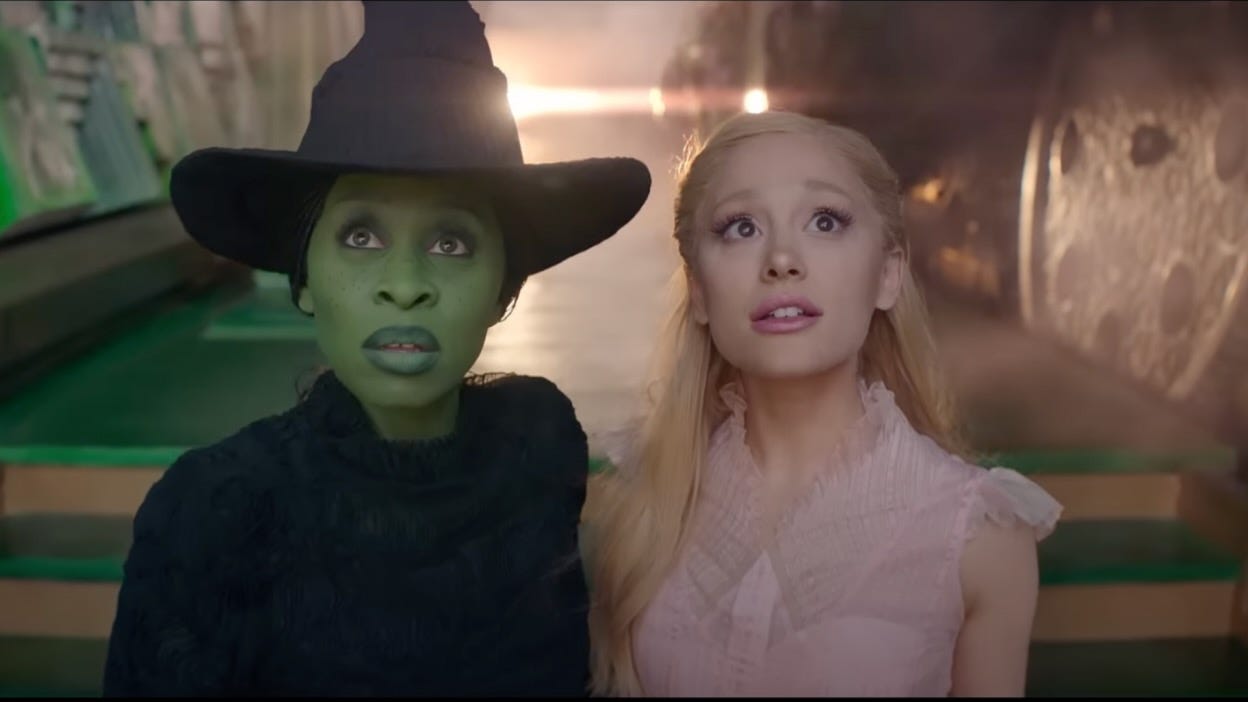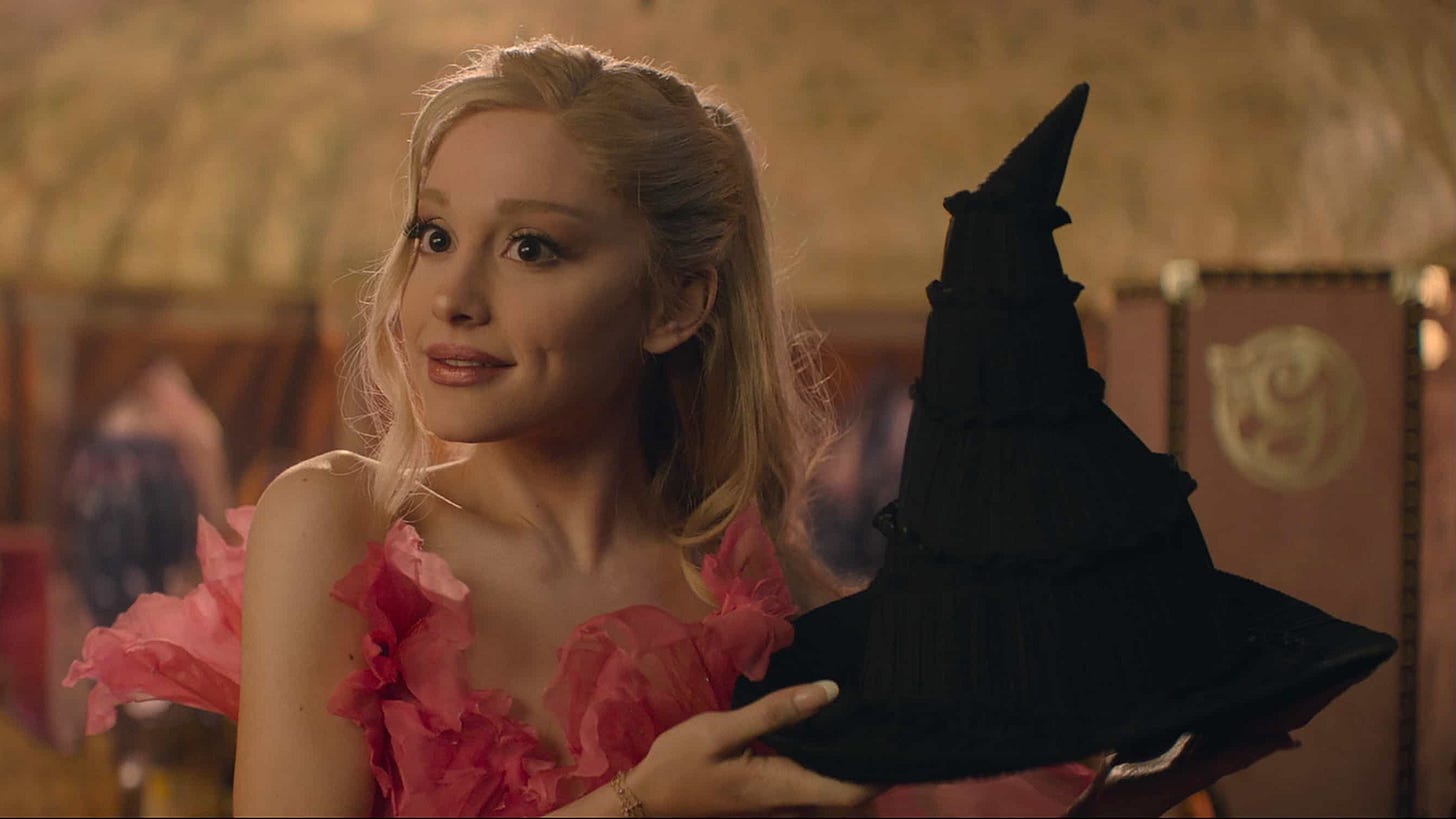Review: "Wicked" lives up to the hype with an insane mic-drop ending
Jon M. Chu continues to be really darn good at this
OK, yeah, the Wicked movie rocked.
I’m late to the party, I know. By the time this review posts, the film has already firmly cemented itself as a cultural phenomenon; part of why I’m getting to it so late is that screenings were widely sold out through the entire Thanksgiving weekend. But I’ll also admit that, as much as I try never to walk into the theater with too much baggage, Wicked is a case where there were a few things holding me back, making me more cautious of the film than I usually would be:
1) I’ve never seen the Broadway musical, and the only songs I really knew from it were “Popular” and “Defying Gravity” (i.e. ‘the two everyone knows’), so I didn’t have any built-in enthusiasm for the show itself.
2) I did read the Gregory Maguire novel the musical is (sort of) based on back in High School, and I bounced off it pretty hard. It’s a much more caustic and cynical piece of storytelling than the musical is, ‘gritty’ in a pretty self-insistent way, and it just wasn’t my cup of tea.
3) The choice to split Wicked into two movies – with the first film alone being longer than an entire performance of the Broadway show – struck me as callous commercial maneuvering; in fairness to me, it arrives as part of a trend of media taking stories that could be told in a reasonable length being stretched to ridiculous extremes, from The Hobbit trilogy ten years ago, to the woefully misguided Final Fantasy VII Remake video game trilogy, to all the books and movies being re-adapted or re-made as full-season TV shows, from Paramount’s Fatal Attraction to Apple’s Presumed Innocent to HBO’s forthcoming, quixotically-misguided Harry Potter series. It didn’t seem crazy to fear Wicked might be another entry in this ever-expanding hall of shame.
4) The trailers for Wicked were misleadingly awful, foregrounding a lot of the movie’s worst CGI effects and doing that annoying, insulting thing Hollywood does where they try to cover up the fact that it’s a musical in the marketing. We hear Cynthia Erivo singing in the trailer, but we never see any hints of the amazing choreography or musical staging in the actual movie.
5) Upon arriving at the movie theater Tuesday afternoon, the 25 minutes of trailers we were ‘treated’ to made me want to go live in a cave and never watch a movie again. Between the Snow White remake, the How to Train Your Dragon remake, the sequel to The Lion King remake, and a handful of other godawful garbage my mind immediately started trying to suppress, it felt like a presentation designed to prove Cinema is dead and has no future.
So yeah: I had heard all the hype, I knew the film was well-reviewed, I was certainly willing to give it a shot, but I didn’t go into Wicked expecting to love it. And while I enjoyed it quite a bit – more than I was anticipating, certainly – I cannot say I ‘loved’ it, on the whole, for most of its run time.
But then the last 15 minutes arrive, and we get “Defying Gravity,” and Cynthia Erivo rips the lid off an already very good performance to reveal she’s giving the mother of all star-making turns, and suddenly Wicked more or less wills itself into becoming an instant classic, a pop culture ‘moment’ no one will soon forget. When the film drops the mic and cuts to credits, I felt like cheering; what an amazingly pleasant surprise.
If I had any hope for Wicked going in, most of it was vested in director Jon M. Chu, and that faith is rewarded in spades. He’s just so goddamn good at this. I remember seeing G.I. Joe: Retaliation back in 2013, basically out of desperation while on a family vacation when there was nothing else to see, and walking out low-key blown away by this fun, lively, kinetic piece of action filmmaking that skillfully thumbed its nose at the kind of dour, shaky-cam nonsense we were getting from Transformers and its ilk. I vividly remember thinking “wait, who the heck directed this?” several times during that movie, and when he really broke it big with Crazy Rich Asians in 2018, it felt like pop culture had finally caught up to all of us who had discovered him in the weird avenues his career had taken thus far, from G.I. Joe to the Step Up sequels to his Justin Bieber concert documentaries to that amazing scene in Now You See Me 2 where the magicians sleight-of-hand their way around a whole team of security guards.
And when it comes to musicals, between Wicked and 2021’s In the Heights, Chu has vividly proven himself the anti-Tom Hooper or Rob Marshall, in that he actually loves and understands musicals and aspires to make them big and bold and unapologetically. Where Hooper tries to outsmart the genre, Chu embraces its expressionistic excesses (there are moments in Wicked where characters step off an established set into fully non-diegetic interior spaces, including a bright pink hallway for Glinda to perform the end of “Popular,” and I wanted to give Chu a high five every time); where Marshall is thuddingly incompetent, unable to stage a musical number without a strict, slavish recreation of a theatrical proscenium, Chu choreographs in three dimensions and knows exactly how to move his camera amidst the dancers, or how to cut in ways that complement the songs and performances. You can tell Chu has done his homework when it comes to movie musicals, and that he’s aware of the pitfalls big, lavish Broadway adaptations can fall victim to. A huge part of why Wicked succeeds where most Hollywood musicals of my lifetime fall flat is that it’s clearly happy to be there – enthusiastic about the very act of being a musical, joyously embracing color and populating its big, imaginative physical sets with dozens of professional dancers.
That enthusiasm extends to the stars, of course. Erivo is obviously extraordinary as Elphaba, but the magic trick of her performance is how carefully she underplays things for much of the movie. She keeps Elphaba buttoned down and internalized, trusts the camera to come to her so she can reveal deeper emotions in small, finely controlled moments of gesture and pause, like her impromptu dance with Glinda (a scene that revels in all the ways a movie can come in close and intimate on the characters in a way a stage show never can). Even when I was finding the movie a little bit arch, which it sometimes is, Erivo is always nuanced and human enough to ground things – and it means that when “Defying Gravity” arrives and she swings fiercely for the fences, the audience can feel the transformation. I mean that literally: the sequence sends powerful chills down the spine not just because the song is great, or even because Erivo’s voice is so magnificent, but because this character and performance genuinely bursts into a deeper gear of commanding substance than we had seen up to this point. It’s stunning, and while I’m probably still rooting for Mikey Madison to win the Best Actress Oscar for Anora, you won’t hear any complaints from me if Erivo takes home the trophy: she’s earned it.
Ariana Grande might be the real revelation, though. Like anyone who grew up Nickelodeon-adjacent, I knew she was funny – her intentionally-bad singing on her recent viral SNL sketch is a thing of comic beauty – but I didn’t anticipate Grande using Wicked to make a case for herself as the second coming of Madeline Kahn. She has that rare ability to be completely in command of her body and voice, weaponizing her own poise and profound vocal chops to create startlingly effective comedy over and over again. I was constantly reminded of Kahn’s work with Mel Brooks, particularly on Young Frankenstein and Blazing Saddles, especially in those moments when Grande goes suddenly from speaking to singing, or throws her body around the set like a Looney Tunes character. I don’t know if there’s anyone left in Hollywood with the requisite skillset to make the kind of comedy Brooks and Kahn once made together, but if there is, they need to be given a giant pile of money and the phone number of Grande’s agent. There is a truly special comedy waiting to be built around her, and I desperately hope we one day get to see it.
There are parts of Wicked that don’t entirely gel for me, some of which are issues inherited from the source material. “Defying Gravity” is the only truly great song the film has, a problem that doesn’t feel so severe when Chu’s creative direction and the cast’s game performances constantly liven up lesser musical numbers, but for a movie that runs over two-and-a-half hours, I wish I liked the soundtrack more. There’s some silliness to the writing (like all the Oz-ian malapropisms) that kind of undercuts the surprisingly pointed political narrative; I prefer the poppier tone of the musical to the grit and grime of Maguire’s books, but there are moments where it definitely tips into tweeness. The film is too long at 160 minutes, with stretches that feel a bit too loose and misshapen, and instead of the Emerald City third act arriving as a natural build and release, it just sort of happens, at the designated point in the run-time where we need a third act. And while the film’s physical sets are excellent, the CGI is much more hit-or-miss; I particularly wish the animal characters were more tactile and ‘present,’ given their centrality to the narrative (Wicked with Jim Henson-style puppets and animatronics for the animals, a la Return to Oz, would be truly remarkable).
But a good ending can wash away much deeper sins than these, and Wicked has such a magnificent mic-drop of an ending that it’s honestly hard to care about anything else. I think it’s entirely appropriate to be skeptical of any and all multi-part splits in Hollywood right now, but Wicked walks the walk. When you have an ending this outrageously good, then yes, I think you have to close the curtain: release audiences on that big, astonishing note, let them process it, and give whatever comes next a chance to stand on its own two feet outside the shadow of “Defying Gravity.” Yes, Universal is going to make unholy sums of money by splitting Wicked in two; but the choice to do so is also, in this case, clearly artistically defensible. Wicked works as its own movie, irrespective of any follow-up, in a way Dune: Part One or Fast X or even Spider-Man: Across the Spider-Verse really don’t; I’d compare it more to Mission: Impossible – Dead Reckoning Part One, in that there’s clearly more story to tell, but this entry feels fully articulated and satisfying on its own terms. And that’s no mean feat.
Read the book 200 Reviews by Jonathan R. Lack in Paperback or on Kindle
Subscribe to PURELY ACADEMIC, our monthly variety podcast about movies, video games, TV, and more
Like anime? Listen to the podcast I host with Sean Chapman, JAPANIMATION STATION, where we review all sorts of anime every week. Watch on YouTube or Subscribe wherever you get your podcasts.




